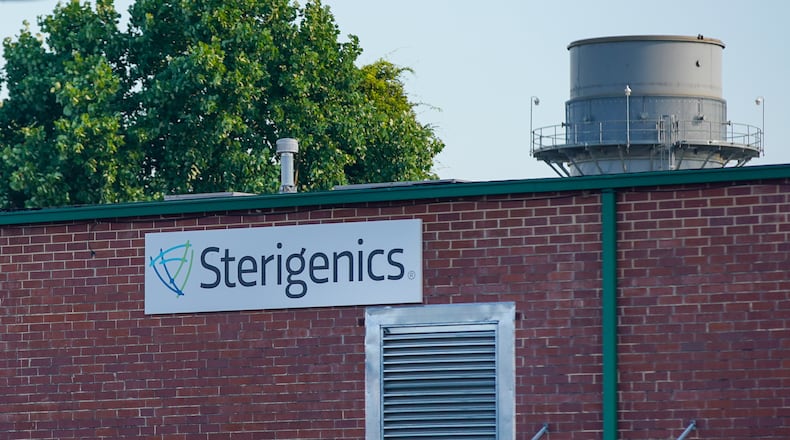Residents and local officials say they’re extremely concerned over a recent report indicating potentially dangerous levels of carcinogenic emissions at an industrial facility in Cobb County.
Last week, an article by WedMD and Georgia Health News highlighted an Environmental Protection Agency air assessment from last year that found several census tracts in Georgia had elevated cancer risks due to ethylene oxide, a gas used to sterilize medical equipment, among other things. The EPA recently concluded that the gas is dangerous at much lower levels than previously thought.
The sites that have been flagged include Covington, in Newton County, and several neighborhoods in Fulton County located just over the river from the sterilization facility run by Sterigenics in Cobb.
Follow-up reports by state officials found emissions in surrounding residential areas were many times higher than the acceptable level set by Georgia.
Despite these findings, the state did not issue any public statements to alert residents.
Teresa Meuter of Vinings said her mother lives less than two miles away from the Sterigenics facility. Meuter found the report “very alarming,” particularly because state officials have not conducted their own air tests, relying instead on self-reported emissions submitted by the company.
“Why aren’t they doing independent air quality testing if this is a known issue, and why aren’t they informing the public?” she said.
Karen Hays, who heads the Air Protection Branch of the Georgia Environmental Protection Division, defended her agency’s handling of the issue. She pointed to federal guidance emphasizing that the EPA report, known as the National Air Toxics Assessment, is intended as a screening tool to help local agencies conduct further study.
She said the EPD is still collecting and processing information. According to a memo from her agency dated June 7, emissions in the immediate surrounding residential areas around the Cobb facility were 27 to 61 times the acceptable level set by the state. Even with proposed mitigation, the projected emissions would be 12 to 24 times the acceptable level, it said.
In the meantime, federal authorities have not issued any new regulation.
“I understand that the public feels that they should have known more about this sooner,” she said.
Sterigenics, based in oak Brook, Ill., and owned by Sotera Health, bills itself as a global leader in sterilization and operates 47 facilities in 13 countries, according to its website.
In a written statement, Sterigenics said it operates safely and in compliance with applicable regulations. It has also taken voluntary steps to curb emissions, it said.
Ethylene oxide “is a vital resource in the sterilization of medical products and devices,” the statement said. “Our Atlanta facility sterilizes many products including surgical kits, radiological syringes, catheters, hospital gowns and IV administration sets which are essential in today’s hospitals.”
The gas is also dangerous. Acute exposure to ethylene oxide may result in lung injury, headache, nausea, vomiting, diarrhea, and shortness of breath, while long-term exposure has been linked to a variety of cancers, according to the U.S. Department of Labor.
Hays said one of the reasons the EPD has not done its own air quality testing is that it lacks the necessary equipment and funding. When her department asked Sterigenics for more recent emissions data, it shows levels much lower than those reported in the EPA’s assessment, she said.
Both state and federal regulators rely largely on self-reported emissions, Hays added.
But State Senator Jen Jordan, D-Atlanta, who represents the affected areas of Cobb and Fulton counties, said state environmental officials have kept the public “in the dark” about the risks of ethylene oxide emissions.
“Although EPD’s own modeling shows that the affected Smyrna areas exceed the state’s acceptable level of risk (“AAC”), it has failed to inform area residents and elected officials, has done no independent air testing in the neighborhoods around the plant, and has no plans to require Sterigenics, or any other emitting company, to reduce emissions,” she said in a statement. “The lack of transparency around this elevated health risk is unacceptable.”
Jordan also pointed to a lawsuit against the company filed by the attorney general of Illinois over a similar facility there.
Cobb County Commissioner Bob Ott, who represents the district where Sterigenics is located, said he had reached out to the EPD to express his concern. His office said the Sterigenics facility is operating legally in an area zoned for heavy industrial use and that the company did not receive any incentives or tax breaks to locate there.
Why it matters: Ethylene oxide is an industrial chemical used to sterilize medical equipment.
It has also been linked to breast, lymphoid, leukemia and other cancers in humans.
In 2016, the EPA concluded the gas is dangerous as much lower levels than previously thought.
In 2018, based on the new threshold, EPA flagged several census tracts in Georgia for elevated cancer risks.
State officials say they are conducting further study.
About the Author
The Latest
Featured


